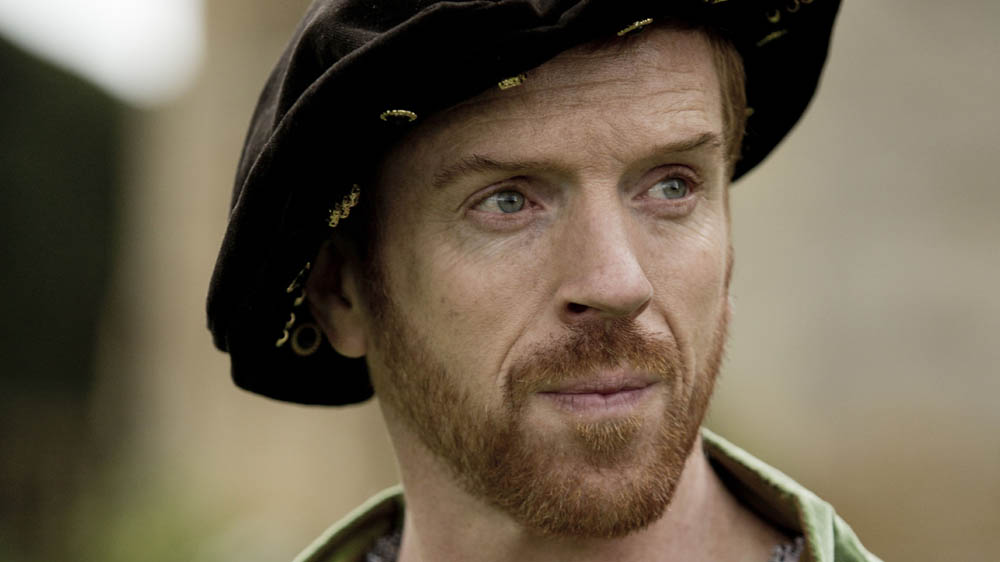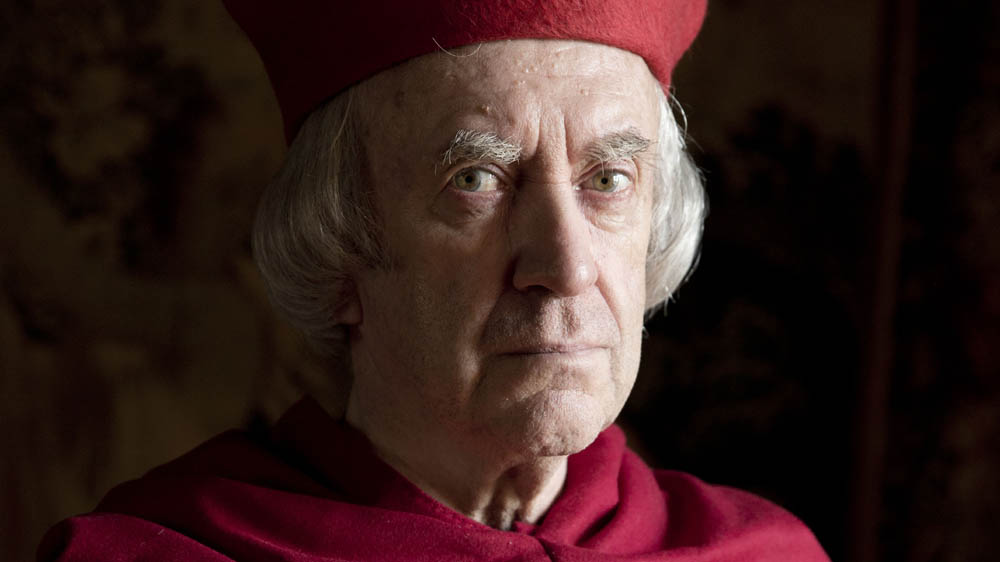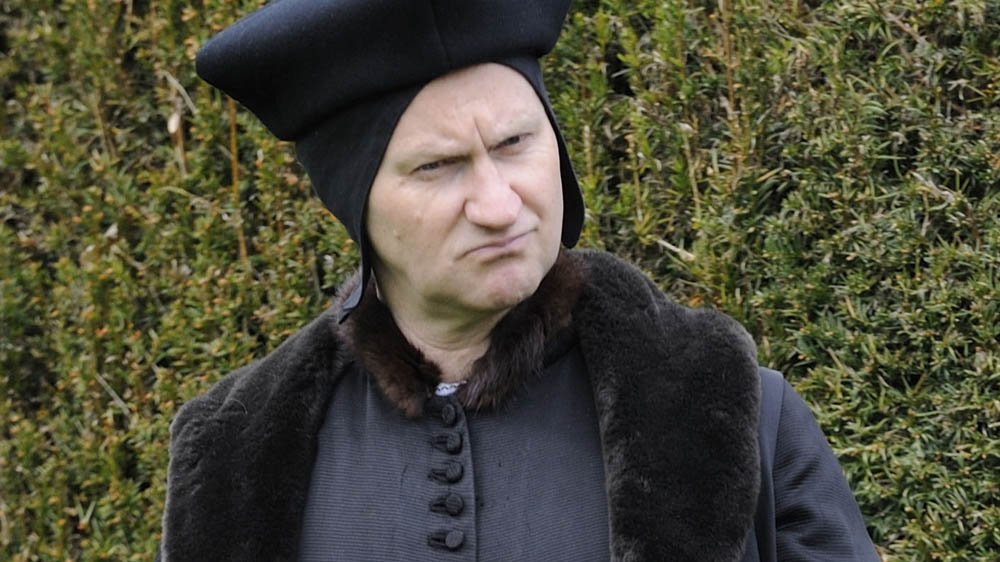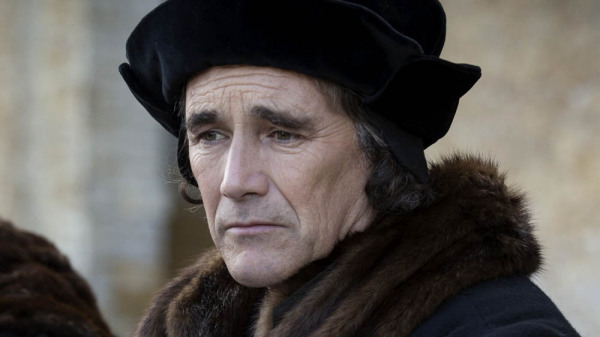Hilary Mantel’s pair of bestsellers, Wolf Hall and Bring up the Bodies have been conflated into a new six-part drama for BBC Two.
‘Sumptuous’ is a somewhat overused phrase for these sorts of things, but it’s a fair description of at least this first episode, ‘Three Card Trick’, which introduces us to Thomas Cromwell at precisely the time when his stars could lead to greatness or ignominy, while Henry VIII attempts his break from the church in Rome.
After being married to Katherine of Aragon for twenty years without producing a male heir, he loses patience with Cardinal Wolsey (Jonathan Pryce) and dismisses him as Lord Chancellor.
The pacing of this first episode is studious, almost glacial. There is a demand on the audience’s attention and intelligence as the story flips through different time periods (at least three) in a similar fashion to the original Mantel novel.
There is inevitably none of the swash and buckle of The Musketeers or even The Tudors. This indicates a return to confidence in the way we consume our costume drama: it’s in every sense an adaptation of a novel, both God and the devil being in the details.
Mark Rylance, very likely our greatest living actor, impresses as Thomas Cromwell (although at times he looks disconcertedly like Jim Dale in Carry On Columbus). Within fifty seconds of the first scene, we are assured of Cromwell’s immense power and influence, despite not being able to hear a single word he says. There is a great intimacy reflected in his watchful eyes as events unfold in front of him.

The episode is told almost entirely from Cromwell’s perspective, which means that we only meet major figures when Cromwell himself encounters them. At many points, we seem to be inside Cromwell’s head (director Peter Kominsky occasionally shoots over Rylance’s shoulder.) Therefore, Henry VIII looms across proceedings Third Man like, an ominous figure until revealed in Damien Lewis’ deceptively genial king.
In Jonathan Pryce, we do not have an arrogant and power hungry Wolsey, but rather a man entirely comfortable as leader of his own domain, casual and comfortable in his own skin. It makes his inevitable downfall all the more believable. When told that the king wants his head (perhaps not literally), his reaction isn’t spittle-flecked incoherent rage, but a rueful sad smile.
He gets to deliver a riff on the old ‘a week is a long time in politics’ line (and manages to reduce it to a single day) and is capable of absolute loyalty to the King, even when the King is about to oust him from home and post for failing to turn the church to the royal need, thereby delaying the marriage to Anne Boleyn (Claire Foy).

Many scenes are shot in a candlelit gloomy hue; dark men having dark conversations in dark rooms. When the action shifts to an outside location in the day, the sudden appearance of sunlight is an abrupt, violent interruption. Otherwise, scenes wash over you like a procession down the corridors of the National Portrait Gallery – snapshots of a long ago age.
This episode is about people being watched, and other people carefully watching: people on the side-lines biding their time, waiting for their moment. Chief amongst this is Stephen Gardiner (a waspish Mark Gatiss), carefully still and bridling. You get the distinct impression – particularly with Cromwell – that each word spoken is hard earned, rationed out only to be spoken when absolutely necessary.

When Cromwell allows himself to swear in polite company, the word sounds genuinely shocking and even dangerous. Even so, the major dialogue is delivered in the white space between the lines, in what is not said, in people choosing not to say what they are thinking.
Pushed even further to the background are the women in the piece, condemned to being silent, married off, or dead. We see Cromwell’s wife Liz, unable to speak while her husband cheerfully flirts with danger (handing his daughter a potentially heretical copy of the bible written in English rather than Latin) or blithely voicing the opinion that his little girl might one day grow up to be Lord Mayor of London and allowing for the possibility that she might be able to allowed to choose the man she marries.
An intelligent adaptation adds the brushstrokes in the background without spending too much time on clunky exposition (Boleyn’s bitterness over Harry Percy in 1523 warrants just a couple of lines of small talk between Wolsey and Cromwell), echoing Mantel’s observation that historical fiction isn’t easy, and that we should share that difficulty with the audience. It demands and repays attention, for instance in conversations between two men called Thomas (an occupational hazard in Henry’s time).
This episode lays all the cards on the table, while Henry attempts to find his lady. As the episode opens, we hear what sounds like a baroque version of Nirvana’s ‘Here we are now; entertain us’. There’s no sleight of hand here: Wolf Hall is rich, rewarding and truly entertaining.
![]()
Aired at 9pm on Wednesday 21 January 2015 on BBC Two.
> Order Wolf Hall on DVD on Amazon.
What did you think of the episode? Let us know below…

